- Home
- Laura Anne Gilman
The Cold Eye Page 2
The Cold Eye Read online
Page 2
She had been raised under a roof, and the first few nights on the Road, the vast open space had unnerved her beyond the telling, the sweep of stars brighter than any lamp, the sheer emptiness of the land a weight pressing her down into the ground until she could barely breathe.
Slowly, over weeks, that sensation had faded, until the open air became familiar as walls and windows, the light of the stars and the passage of the moon the only comfort she needed, the emptiness filled with the less-subtle noises of the night, the howl and barks of predators, the flutter of wings as soothing as the sound of slippers in the hallway.
But that night, she missed Gabriel, his low voice telling stories of how Badger pulled first man from stone, or Buffalo created the plains, or teaching her to identify an animal by the flick of its tail, or a plant by the turn of its leaves. She missed the sound of his breathing as he slept across the fire from her, the snort and mumble when he dreamed. She missed the collective sighing and grumbling of his horse, Steady, and Flatfoot the mule when they were picketed together with Uvnee.
Even the Jack would have been welcome company, simply to feel another person nearby.
“Foolishness,” she told herself, startling a stripetail that had crept close to see if she’d left scraps for it to scavenge. She kicked the ground to discourage it, and it fled.
Unwilling to sleep just yet, Isobel took her journal out, wetted her pencil, and wrote down what she had seen, how many bodies and how they had been butchered, what had been taken and what had been left, and a description of the hollow where she’d found them, the shape of the hills from where she’d stood. The boss might want to know. More, she had promised to remember.
When she slipped the journal back into her pack, her hand touched something else, not cloth, that crinkled under her fingers. She’d almost forgotten about the letters. Two waxed envelopes had been at the postal drop, one addressed to a Matthew Smith someplace called Tallahatchie, and one . . .
And one for Gabriel. The envelope had been battered at the edges as though it had traveled a long way, but his name was written in clear script on the dun-colored envelope. Master Gabriel Kasun.
You didn’t meddle in another’s business in the Territory. You didn’t ask questions you’d no need the answers to. She left the envelopes where they were, refusing to indulge any curiosity in who might be writing to her mentor, and lay down, pulling the blanket more closely around her shoulders. Sooner she slept, sooner she’d be on her way again, sooner she wouldn’t be alone.
Wake, Hand.
Isobel couldn’t move. Nothing bound her, nothing held her down, but she could not convince her limbs to lift, a soft indolence encasing her as securely as if she were swaddled like an infant.
Wake, Hand.
The voice was insistent, the shape of it poking, prodding. “I am awake,” she tried to tell it, then realized that she wasn’t. She was dreaming, and the voice needed her to wake.
Her eyes opened, the stickiness on her eyelashes evidence that she had been asleep for several hours. The belly-rounded sliver of the moon was sinking, the stars beginning to fade, and she estimated, groggily, that it was a few hours before sunrise. The coalstone glimmered faintly within its circle of rocks, and she could hear Uvnee shifting, but it was a peaceful, sleepy shift; whatever had woken Isobel had not disturbed the mare or roused her to defense.
What had woken her?
Gut feeling made Isobel turn her head away from the coalstone, scanning the dark air next to her for the shadow of a snake, its tongue flickering secrets; a native stepping quietly through the night; a demon lurking, intent on mischief. But there was nothing there save grass. Nothing came visiting tonight.
You must go.
Her bedroll was packed away and the coalstone cooled before Isobel realized she had been directed to do so. She paused, drawing a sharp, shocked breath. An owl called twice in the darkness, and she waited, half-expecting a third call that never came. If an owl called three times in the night, it meant medicine was being worked. Two calls, it merely hunted unsuspecting mice.
Beyond that, there was only an echoing silence, the night creatures stilling, the dawn birds not yet singing.
An empty space in the world, through which other voices could be heard.
Go.
It did not feel the same as what had drawn her to the slaughtered buffalo. That had been a feeling, a pressure, a pull. This was . . . like the boss, when he used a particular tone, but nothing at all of that warm, familiar voice. There was nothing human in this at all, and it would not be refused.
Isobel finished breaking her simple camp, waking Uvnee and replacing her blanket and saddle with a soft apology. “We’ll make up breakfast later,” she said as she mounted. “We need to be on our way now.”
The sigil in her palm remained cool in her skin, the black lines invisible in the darkness, and yet she knew the way she knew things now that the whispering voice was a summons she could not refuse.
Was it about the buffalo? The spirits of the dead lingered until they were laid to rest, protected. Did the spirits of animals do the same? She had made a promise . . . Was she now being driven to satisfy it?
“Boss?” She knew he couldn’t hear her. The devil might have long ears, but there were none that long, to cover the breadth of the Territory; she was months from home, and he had more to do than listen for her.
Uvnee snorted, her warm breath almost visible in the chill air, and turned her head to nip at Isobel’s skirt, as though asking why she’d been woken and saddled if they weren’t going to go anywhere. Isobel patted the mare’s neck with the hand not holding the reins, reassured by the solid warmth of muscle and flesh. “You’re right,” she said. “I’m sorry.”
She buttoned her jacket and tucked the fabric of her skirts under her legs, then gave the mare the signal to move forward, both of them keeping their eyes on the grass in front of them: traveling in the dark was always dangerous, and the grass could hide any of a dozen threats, from gopher holes to snakes, to ground suddenly wet and slippery from a hidden creek.
The stock of her gun, a new acquisition in La Ramée, rubbed against her leg, but its presence gave her little comfort. Gabriel was the sureshot of the two of them. She could hit things most times out of ten, but not always, and she’d never yet had to shoot at a thing that went on two legs.
Only a fool would be riding before dawn, alone, driven by a whisper in the dark. But her life was not her own. She kept riding, north and west of where she’d planned to go, farther away from the campsite where Gabriel was waiting, until the sky began to shift from black to purple, and from purple to streaky red ahead of the sun.
It was full dawn when Isobel rode over yet another low, undulating hill and saw a narrow river cutting through the shallow valley below, the outline of a small farmstead a little ways uphill from it, on the other side. Her destination?
No answer came, either by whisper or sigil-burn.
There were three buildings set in a grassy clearing: two square, low-roofed houses and a barn set around a trampled-down center. Beyond that, there was what looked like an icehouse, half-hidden under the turf, the buildings weathered from both winter’s wind and summer’s sun, doors shut and windows shuttered.
Cautiously, she rode Uvnee into the creek, the water splashing at her boots, soaking the mare’s legs, Isobel’s gaze slipping from right to left and then back again, waiting for . . . something, anything, to appear or attack.
Halfway across, she felt the warding, a dozen prickly slaps against her chest and arms, making her fingers spasm on the reins before the prickling faded and disappeared. The wards had recognized her—or, more likely, the devil’s sigil she carried —and named her friend and welcome. Isobel’s muscles eased slightly, but she remained alert. There was still no movement she could see, no cows lowing or the enthusiastic he-hon of pigs to be heard, and no one had yet come out to greet her. Was there illness here, as at Widder Creek, or had the farmstead been abandoned under th
reat?
Uvnee heaved herself out of the creek and up the slight bank, coming to a pause when Isobel eased the reins back, still cautious, still waiting.
Illness or violence. She had been called for nothing else yet.
The knife in the darkness. That was what the boss had called her. Maria was the Right Hand, the open hand. The Left was forever curled around a weapon.
Her right hand rested on the hilt of her knife, the butt of her blunderbuss hard against her thigh, and she calculated how quickly she could reach for the silver in her pocket if she needed it. But those musings were cut off when a woman exited one of the low houses, turning to face the newcomer, and the morning sunlight showed that the woman was native.
Isobel felt a momentary pang of uncertainty: had she given offense by riding in, uninvited? The warding had recognized her, but she had only been in a few native encampments before, and always with Gabriel at her side.
The woman called out then, saying something in a language Isobel did not know. She shook her head, lifting her right hand to her left breast and then out, ending with her palm to the sky, thumb and index finger extended, then swept her hand, fingers extended, to the right. She thought—hoped —that was the sign for not understanding, that she was doing it right, that they didn’t use another gesture, that she hadn’t just said something terribly rude.
Gabriel would have known.
The woman gave her another glance, then, in clear but halting Spanish, said, “Tu monta temprano, y solo.”
“Lo siento si me ofender,” Isobel said, sliding down from Uvnee’s back, to put herself on equal ground. “Mi nombre es Isobel de Flood. La mano de Diablo.”
Marie had taught them that formality and politeness could head off problems before they became problems. She had been speaking of bar fights, but Isobel saw no reason it wouldn’t hold here, too. The warding had recognized the sigil, but that did not mean this woman would, did not mean that she was welcome.
She studied the woman anxiously, looking for some sign of recognition or acknowledgment. There were strands of silver in her black hair, and lines around her eyes and mouth, cutting deeply into the skin there. She was older than she appeared, far older than Isobel herself, but not elderly.
“I am Jumping-Up Duck,” the woman said, still in Spanish, studying Isobel in turn. “Why have you come here now, Hand?”
That was a fair question, if awkward to answer. She fell back on a question of her own. “Is all well here?”
“Yes. Of course.” The woman’s face was calm, her mouth solemn, but Isobel knew a lie, no matter how well someone hid it behind a smile or a steady look.
But people lied all the time. Some did it to hide the truth, some because they weren’t ready to speak the truth yet, some because they didn’t know the truth yet. The why was what the boss had taught her to discern.
So. She did not think anger lay behind this lie. Isobel breathed, listened. Worry, she thought. And . . . unnerved. Something unnerved the woman, and she felt she could not, dare not speak of it. What, and why?
Isobel tried to remember everything Gabriel had told her, trying to remember the few exchanges she’d had with women in the native villages they’d visited. Few, too few; she’d relied on Gabriel too much. But still, this was no different from what she had done at the saloon, convincing people to trust her, drawing the truth out so that it could be dealt with.
“Another day, I would have nodded and left it be,” she said, leaning against Uvnee and petting the mare’s soft nose, making herself seem gentler, easier to speak with, one woman to another. “I would have nodded and perhaps let someone else dig into the root of your sorrow, thinking it none of my business. But the Master of the Territory sent me in his name.”
She was bluffing. But Isobel had been raised in a saloon, seen the best bluff against the best and fold. She knew what she was about.
A heartbeat, then another, and the woman shook her head, although the edges of her lips turned up in what might have been a smile, if there wasn’t such worry underneath. “You will join us for morning meal?”
The invitation was an admission. Isobel kept her satisfaction tight inside, and said only, “It would be my honor.”
No sooner had she accepted the invitation than the door of the nearest cabin opened, and another woman came out, followed by a man, and after them, a tumble of children and two skinny, rough-coated dogs, all wildly excited not by the appearance of another person but by her horse.
“They know better than to get within kicking distance,” Duck said, although it wasn’t clear if she was referring to the children or the dogs or both.
“Hello,” the second woman said in English, pushing the children away. “I’m Elizabet.” Isobel realized she was staring, and stammered out a greeting. Elizabet was pale-skinned, with hair paler blond than any Isobel had ever seen, the man with her a square, burly knot with the same pale skin and paler hair. “This is Karl,” Elizabet said, and he nodded once. “Halla.”
As though a signal had been given, three more people emerged from the other building, walking over to join them.
“This is Margot, my sister”—Elizabet brought the other woman over with a familial arm around her waist—“and her husband Four Wolves, and his brother, Catches in Teeth.”
Isobel had caught up with her surprise enough to greet them politely. The brothers shared Duck’s round face and prominent cheekbones, and wore attire similar to Karl’s: long cloth pants and low boots under sleeveless tunics that showed off muscular arms. The women all wore long-sleeved shifts, the deerskin decorated with red and blue beads at the shoulder and hem, unadorned moccasins on their feet.
“This is Isobel,” Duck said. “She joins us for breakfast.”
As simple as that, as though it were perfectly ordinary for a stranger, a woman to ride up. Or perhaps, because it was so isolated, they welcomed any visitor without question?
After the wardings vouched for them, at least.
“I will stable your horse?” Karl asked, and Isobel offered him the reins without hesitation: they had welcomed her in hospitality, and it would give insult if she doubted it. Karl led the mare off to the stable, the pack of children and dogs following at his heels. He walked with a slight limp, she noticed, barely visible, favoring his right knee as though he had taken a blow there, hard enough to linger.
“Come,” Elizabet said, and in a matter of moments, the women had set up a long plank table, with roughhewn chairs beside it, while the children settled with their plates on the ground, rough-and-tumble like puppies. Duck’s husband, a silent shadow of a man Duck referred to only as “my man,” joined them, bringing bowls of what smelled like maple porridge and warm meat that made Isobel’s stomach rumble rudely.
He laughed at her, although he made no noise and his smile showed no teeth, and shoveled a larger portion onto her plate.
She could almost hear Gabriel’s voice in the back of her ear, advising her: hospitality, and then the devil’s business.
The food was excellent—far better than anything she or Gabriel had managed, but Isobel found herself distracted by her companions. Not the four natives—although their hair and skin were darker, they reminded her of Iktan, the old bartender in Flood. It was the whites who distracted her: Elizabet and Margot’s skin was the faded white of oft-washed linens, and their eyes were the pale blue of sageflowers. Karl’s were only a shade deeper blue, his eyebrows bleached nearly white by the sun.
Elizabet noticed her staring, but when Isobel blushed, ducking her head, the woman only laughed, not unkindly. “When I first saw Four Wolves,” she told Isabel with a wink, “I thought he was covered in mud, and tried to scrape it off.” She placed one hand on her husband’s arm, a smile turned up at him. “It’s a wonder he kept us.”
He snorted but patted her hand with his own, still eating.
“You’re curious,” Elizabet went on. “How we came to be here, such an oddling group.”
Isobel would not have aske
d but would not deny her curiosity, either.
Margot had a deeper voice than her sister, and spoke so quietly Isobel had to strain to hear her. “Our parents came to the American country, thinking to give us a better chance, but it . . . did not suit.” Her shoulders lifted in a faint shrug, although there was a bitter wistfulness about her that said she did care, still, very much. “And then one day Elizabet spoke with a gospel sharp who rode through our town, and he told of us a place across the river, a wild land, god’s land, where we could have purpose. To save the savages.” Her laugh carried that same bitter wistfulness.
“But the gospel sharp’s mission was . . . well.” Elizabet shrugged as well, hers a loose movement of one shoulder, and Isobel caught a glimpse of faint red scarring along her neck, like the burn from a rope. “There was strife. Four Wolves brought us here, and here we stay.”
Strife enough to drive the five of them from away from all their people, enough to bring Duck and her husband, of some unknown relation, with them. Isobel would ask no further, save one thing she needed to know. “This sharp. Does he have a name?”
Catches in Teeth answered her. “None that is spoken now.”
The tribe he’d given offense to had dealt with him on their own, then. Isobel nodded and let it go.
“And here you . . . farm?” Her voice lifted, making it a question, although there were no fields to be seen, save a small garden patch between the houses.
“We hunt,” Catches in Teeth said. “Enough to keep us. We welcome those who travel between the villages and the sacred lake. We keep the agreement here”—and his voice was like a rumble of thunder on a clear day, low, but sharp and clear. “Better than most.”
Isobel’s gaze went to his, but there was nothing in his eyes to suggest deeper meaning in his words. The Agreement had been made with long-gone tribal elders, back when the grandparents of Jumping-Up Duck’s grandparents had been young, to keep balance between natives and outsiders looking to make the Territory their home as well. Did he mean to say that there were those here who did not abide?

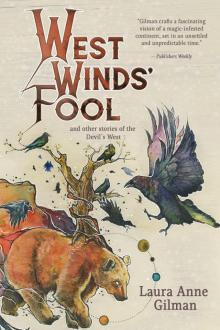 West Winds' Fool and Other Stories of the Devil's West
West Winds' Fool and Other Stories of the Devil's West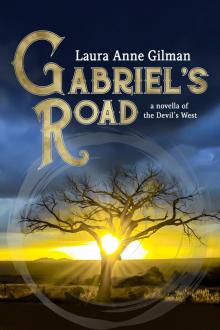 Gabriel's Road
Gabriel's Road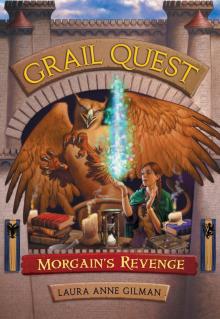 Morgain's Revenge
Morgain's Revenge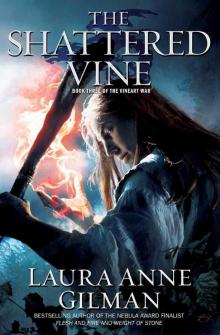 The Shattered Vine
The Shattered Vine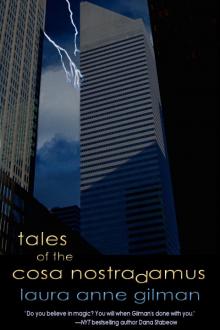 Laura Anne Gilman - Tales of the Cosa Nostradamus
Laura Anne Gilman - Tales of the Cosa Nostradamus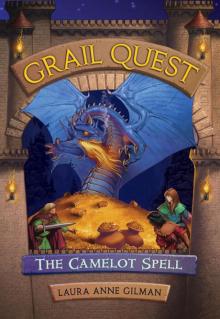 The Camelot Spell
The Camelot Spell VISITORS
VISITORS Staying Dead
Staying Dead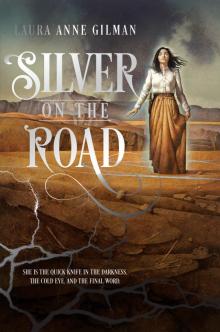 Silver on the Road
Silver on the Road Weight of Stone
Weight of Stone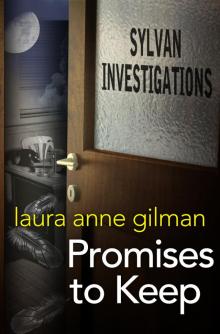 Promises to Keep
Promises to Keep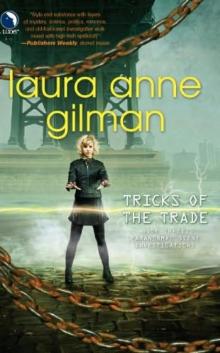 Tricks of the Trade psi-3
Tricks of the Trade psi-3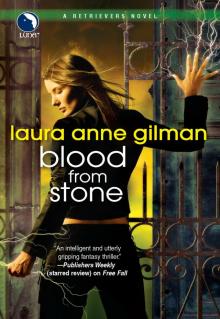 Blood from Stone
Blood from Stone Soul of Fire tp-2
Soul of Fire tp-2![Pack of Lies [2] Read online](http://i1.bookreadfree.com/i1/04/01/pack_of_lies_2_preview.jpg) Pack of Lies [2]
Pack of Lies [2] Burning Bridges
Burning Bridges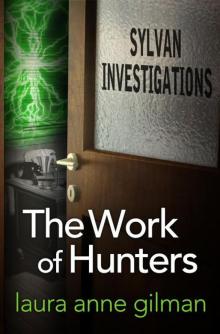 The Work of Hunters
The Work of Hunters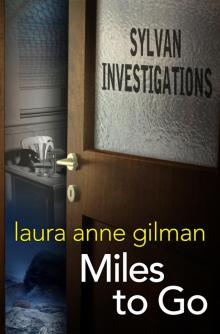 Miles to Go
Miles to Go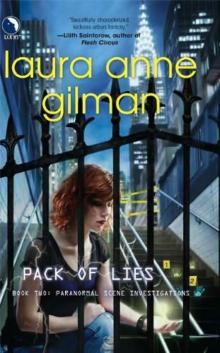 Pack of Lies psi-2
Pack of Lies psi-2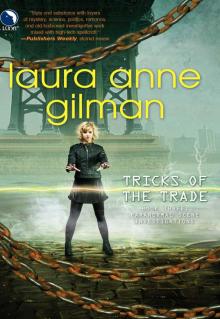 Tricks of the Trade
Tricks of the Trade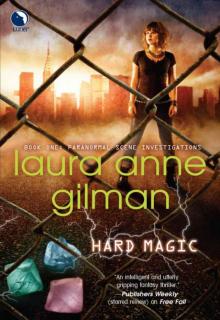 Hard Magic
Hard Magic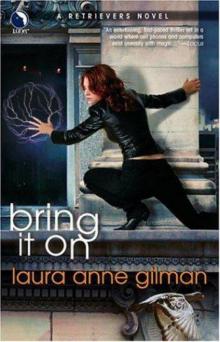 Bring It On
Bring It On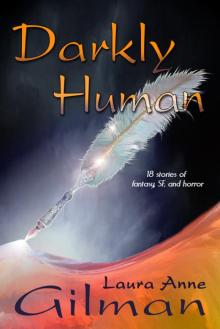 Darkly Human
Darkly Human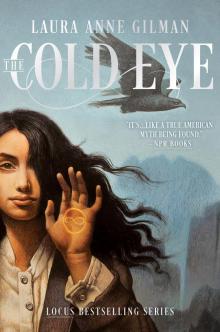 The Cold Eye
The Cold Eye An Interrupted Cry
An Interrupted Cry Soul of Fire
Soul of Fire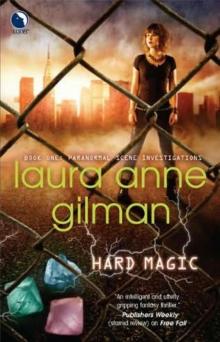 Hard Magic psi-1
Hard Magic psi-1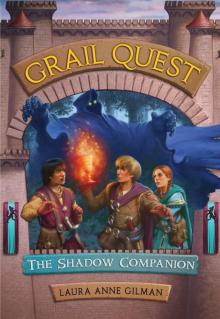 The Shadow Companion
The Shadow Companion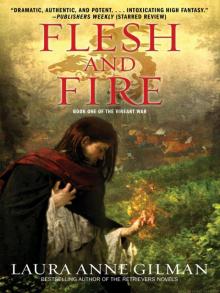 Flesh and Fire
Flesh and Fire